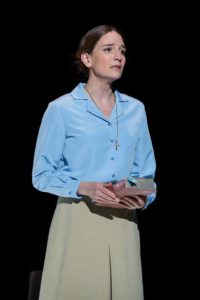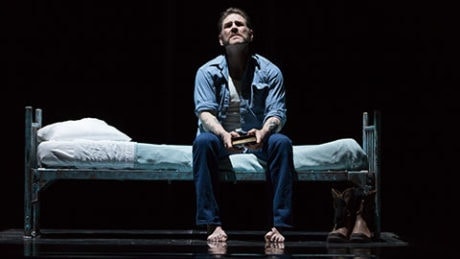It is certainly a “Dark Night of the Soul” (St. John of the Cross) for Sister Helen Prejean in the contemporary opera Dead Man Walking. A meditative, spiritually resonant study of our common humanity in the face of unspeakable horror is presented in this probing Washington National Opera production with absolutely stunning production values, vocalizing of the highest order, and the laser-beam directorial eye of Artistic Director Francesca Zambello. Ms. Zambello has provided the DC Metro Region with a production that, while socially relevant, is also a very solid piece of opera for any opera purist who may only like music written before the last 100 years!
Based on the real –life story of Sister Helen Prejean (Kate Lindsey) and convicted murderer Joseph De Rocher (Michael Mayes) – which was initially explicated in the book by Sister Prejean and the famous film directed by Tim Robbins – this penetrating and absorbing opera does not delve into heavy polemical statements. Instead, the creative and artistic approach utilized is to show the viewpoints and thoughts of the victims as well as the accused.

The theme of “the journey” is explored throughout the play, both literally and spiritually. In the opening of the opera, as Sister Helen travels to the prison to make her initial visit to the condemned Joseph, the hot weather and the exhaustion of the character of the ever-striving Sister Helen can be felt in the superlative soaring vocal tones of mezzo-soprano Kate Lindsey.
Ms. Lindsey’s lead role requires her to be almost constantly on stage. Luckily, she has superior vocal control and pacing which propels her through this challenging role. Ms. Lindsey’s aria questioning her ability to face the mission God impels her to fulfill is mesmerizing –Lindsey sings with a purity of tone that is almost ethereal in effect. Throughout the opera, Lindsey compels us with her many moments singing for strength and God’s mercy during crucial dramatic scenes.
Ms. Lindsey performs with an edgy characterization that stresses feistiness and humor to propel her through scenes that could be too overtly sanctimonious.
Ms. Lindsey and the entire ensemble are well served by a libretto from the prolific Terence McNally that strikes just the right tone between polemic and easy sentiment and which accentuates what is most vital to composer Jake Heggie’s textured music.
Heggie’s music manages to be both ravishingly dramatic at the appropriate times yet eminently nuanced in support of this vital story. Conductor Michael Christie brilliantly conducts Heggie’s superb music; Christie instinctively wields his baton to captivate the listener to absorb every note of Mr. Heggie’s soaring music. Mr. Heggie’s music is vibrantly dramatic and visceral but never overpowers any of the proceedings in an overt manner. Subtle swirling motifs of music occur throughout as well as more meditative rhythmic passages.
An aspect of this production that simply astounded me was the above-par staging of the many large crowd scenes. Striking set design by Allen Moyer utilizes a large catwalk that loomed over the stage and ingeniously encompassed the various groups in the opera such as the inmates, children and parents of the victims. At the end of Act One, as Ms. Lindsey descends into a harrowing spiritual and inner struggle, a large black screen rises and reveals taunting prisoners and angry crowds as a surge of deliberately cacophonous music arises to mirror the anguish that is occurring in the heart of Ms. Lindsey’s Sister Helen Prejean. Differing levels of the ensemble appear and disappear to enhance the dynamics of the libretto. Masterful staging!
The Washington National Opera Chorus, the Washington National Opera Children’s Chorus, and the Washington National Opera Orchestra all perform with stellar synergy to ensure the complete success of this approach.

As the convicted prisoner, Joseph De Rocher, Baritone Michael Mayes is a powerful stage presence. Mr. Mayes possesses an engaging physicality and he plays his role with an edge of ironic dry humor about his eventual fate. This makes the very realistic finale of this opera all the more unsettling and spellbinding.
Mr. Mayes has a voice that would make the Gods weep with envy. Mr. Mayes’ aria when he muses about his family background and upbringing was delivered with lush deep and resonant chest tones. Mr. Mayes’ vocalizing when he sang of his impending torment was encased with pain and agony, and his duets with Ms. Lindsey were well paced and showed his character’s reluctance to admit facts.
Renowned mezzo-soprano Susan Graham played the role of Mrs. De Rocher with a natural aplomb that mixed myriad moods of confusion, despair and anger with ease. Ms. Graham possesses the ultimate talent of making her singing real and honest in dramatic impact – her vast operatic experience shines with a remarkable sense of authenticity in her interpretation and singing.
As Sister Rose, soprano Jacqueline Echols, sang an aria about the meaning of forgiveness that was sensitive and delicately wrought.
Bass-Baritone Wayne Tigges gave a very insightful performance and sang with natural ease.
Baritone Michael Adams excelled with an air of masculine authority and rich, expressive tones in his dual roles of the motorcycle cop and prison guard #1.
Costume design by Jessica Jahn was appropriate to the mood of this piece and the lighting design by Christopher Akerlind was evocative. Fight master Joe Isenberg choreographed with skill.
All of the elements have come together in this splendid Washington National Opera production under the astute directorial hand of the continually innovative Francesca Zambello.
A journey through pain, anguish, mercy, forgiveness and redemption will linger in your heart and soul if you make time to see the Washington National Opera’s production of Dead Man Walking.
Running Time: Two Hours and 20 minutes, with one 25-minute intermission.
Dead Man Walking plays through March 11, 2017, at the Washington National Opera performing at the Kennedy Center Opera House – 2700 F Street, NW, in Washington, DC. For tickets, call the box office at (202) 467-4600, or go online.




